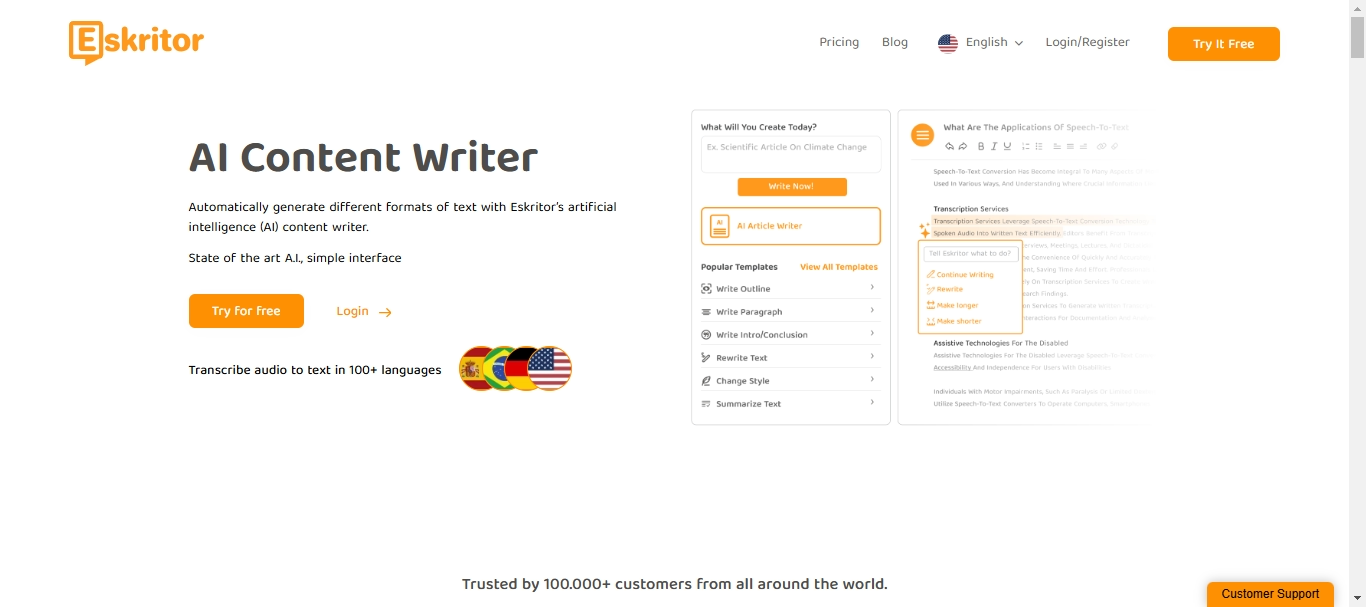If multiple articles optimize for the same search queries, they might affect the chances of ranking. It might become difficult for Google to distinguish which article should rank highest for a specific query. In this article, you will delve deeper into keyword cannibalization. Also, learn ways to prevent it by using AI-powered tools such as Eskritor.
What is Keyword Cannibalization?
Keyword cannibalization happens when multiple pages of a website target the same keyword, causing SEO issues. This results in the same website pages competing against each other.
When site pages compete against each other for search engine rankings, it can dilute the ranking of the website. For example, if you have two pages about the same topic and combine them into one to get more traffic, this causes cannibalization and affects the organic performance.

How Multiple Pages Compete for the Same Keyword
Multiple pages competing for the same keyword may indicate keyword cannibalization. Many businesses create various pages of content on their website on the same topic. They can do it by covering the topic in detail, targeting vital phrases, and creating content. This can cause multiple pages to erode the chance other pages rank well in the search results.
Common Signs of Keyword Cannibalization in SEO
In SEO, keyword cannibalization is a prominent challenge a website faces. This is because the algorithm scans keywords and sorts them by search intent. Here are some common signs of keyword cannibalization in SEO:
Low Rankings and Traffic
One of the common indicators of keyword cannibalization is dipping traffic. This occurs because cannibalization can impact your search position negatively. When multiple pages rank for the same keyword, it is difficult to determine which page is the most relevant to rank.
Reduced Page Authority
Some important factors for a website's ranking include authority signals, backlinks, and the quality of the content. These factors determine how well the search engine will rank the pages.
- When cannibalization occurs, it divides these authority signals. This results in only a few low-authority pages rather than one with high authority.
- Distributing authority among pages makes it difficult for your page to outrank other high-authority pages.
Distributed Internal Links
Internal links distribute authority across different pages on your website. When keyword cannibalization occurs, it spreads the internal links across multiple pages.
To avoid this, you must link to different pages in every location for relevant anchor text. A fragmented linking structure can reduce each page's authority.
Poor Conversion Rates
Another sign of keyword cannibalization is that it can negatively impact the user experience. When you create multiple pages for the same topic, it can be overwhelming for users. They might need clarification about which topic has the most updated information, which diminishes the content quality.
Wasted Crawl Budget
Search engines allocate a limited crawl budget to crawl the website. Every instance of keyword cannibalization can lead to a waste of the crawl budget. When you waste crawl budgets on similar pages, you skip focusing on unique content.
Why is Keyword Cannibalization Harmful to SEO?
Keyword cannibalization is harmful to SEO as it can negatively impact the ranking of your website. When you have multiple pages on the same topic, it can lead to unwanted rankings. It can indicate an opportunity to consolidate content to improve organic traffic.

Dilution of Ranking Potential Across Pages
Keyword cannibalization dilutes a website's overall authority. It happens when multiple pages of a website target the same keyword and spread the ranking potential, resulting in low rankings for all the affected pages.
You may also notice multiple website pages receiving traffic for the same keyword. This is another indicator of cannibalization and dilutes the traffic potential even for one single page of rank higher.
Impact on Website Performance and User Experience
Regardless of the cannibalization type, keyword cannibalization can impact your website's organic search performance, revenue, and user experience. Cannibalization can hinder performance when the top-ranked page lacks optimization for the search intent.
- When the other page addresses the search intent but not ranking first, the top-ranked page does not correspond to the search intent.
- This could signal to search engines that the ranking page does not satisfy the query intent, diminishing organic performance.
How to Identify Keyword Cannibalization Issues on Your Website
Initially, keyword cannibalization might be a tricky issue to tackle. With the right tool, you can identify cases of it. Tools such as Ahrefs, SEMrush, and Moz have features that allow you to insert your website URL and analyze keywords.

Using SEO Tools to Spot Competing Pages
You can use keyword research tools to get comprehensive data for better keyword planning. This will help you find keyword cannibalization quickly and reduce time and effort. These tools can help you weed out competing pages on your website.
To track keyword rankings and keyword performance, you can use tools like Google Analytics. Once you use data to modify your keyword strategy, you can fix keyword cannibalism.
Monitor Rankings and Traffic Fluctuations
Traffic fluctuations can occur for several reasons, such as website migration or natural traffic fluctuation. Traffic fluctuation is inevitable if you work in a niche that depends on a season.
How to Fix Keyword Cannibalization Effectively
There are many ways to fix keyword cannibalization, such as redirects, canonical tags, optimizing links, optimizing content, and more. The basic idea behind fixing keyword cannibalization is to pick one preferred page for each affected keyword. Next, make a clear preference for Google so it knows which page to rank highest on.
Merge or Consolidate Competing Pages
Keyword cannibalization can signal an opportunity to consolidate content to improve organic performance.
- Once you identify a cannibalization issue, you can improve organic performance by combining the pages.
- Once you consolidate the page, you redirect an outdated page to something more relevant that you have.
- You can also combine multiple pages to create something new.
Use 301 Redirects to Guide Search Engines
You can redirect all your overlapping pages to a new URL to guide search engines. However, a better option would be to build the performance of the existing page.
- You can optimize your content for target keywords once you draft an updated version of the latest page.
- Next, publish the new version of your preferred page using your chosen URL.
- Place 301 redirects to the preferred page from the cannibal page.
- This shows Google that you have replaced the cannibal page.
- Once you identify any internal links, update them to prevent internal redirects.
- Lastly, as Google recommends, remove the directed URLs from the sitemap.
Optimize Internal Linking Structures
Internal linking helps the search engines understand the structure of your website. How you place them tells search engines which pages are more important. You can use internal linking to increase the page authority for cannibalized pages.
- To do so, identify all the cannibalized pages and select the most important one for a particular keyword.
- Next, add links to that page from all the other cannibal pages.
- This will let the search engine know which page is the most relevant to rank for a particular keyword.
Preventing Keyword Cannibalization with AI Tools
AI-powered research tools can help prevent keyword cannibalization. These tools analyze and organize keywords into clusters and help with site structure, content strategy, marketing strategy , and more. You can use AI tools to prevent keyword cannibalization. These help avoid publishing duplicate content and create landing pages to organize category pages.

Manage Keyword Cannibalization with AI Writing Assistants
AI-powered tools help in SEO by automating keyword research and content briefs. By adding human insights to AI-generated content, AI writers can focus on taking the content from good to great. You can also use the tool as a writing assistant for SEO optimization.
Artificial intelligence writing tools such as Eskritor help AI content writers curate, edit, and check for content quality. These practices ensure the final content aligns with the best SEO practices and prevent keyword cannibalization.
Generate SEO-Friendly Content with AI Tools
With AI tools such as Eskritor, you can generate and refine SEO-friendly content. It provides an AI content optimization feature with which you can define objectives and goals. You can collect and analyze relevant data, conduct keyword research, generate content, and analyze it for SEO.
Improve Content Strategy with AI-Driven Insights
With the right prompt, AI assistants can provide significant SEO-friendly content in less time. With Eskritor, you can create copies, edit, and even analyze content for SEO. Eskritor is also used as an AI text generator for content strategy.
Best Practices for Ongoing SEO Optimization
SEO best practices aim to improve your website's search engine ranking. These best practices include on-site optimization, keyword research, and backlink building. Another critical SEO best practice is to avoid duplicate content or near-duplicate versions of your content.
Regularly Audit Content to Prevent Keyword Overlap
As mentioned before, preventing keyword cannibalization is crucial to optimizing SEO performance. The first step is conducting site audits and content planning.
Once you identify overlaps, jump in to consolidate your content, use canonical tags, and implement internal linking.
You can use tools like SEMrush, which offers features to identify keyword cannibalization. Its site audit tool can analyze your website and identify keyword overlap.
Develop a Clear Keyword Map for Content Planning
You must have heard a lot about keyword research for SEO. Another term is keyword mapping. It helps you understand where you should use valuable keywords during your research. In short, it identifies and assigns relevant keywords for SEO to your website pages.
Keyword mapping is a multi-stage process that involves research, keyword selection, grouping keywords into categories, and assigning them to specific pages. It is essential to help digital marketers achieve better SEO results by ensuring their content is well-optimized.
Conclusion
Keyword cannibalization is one of the prominent challenges faced by a website. It occurs when the different pages of the same website compete against each other. Creating multiple pages for the same topic can be an overwhelming experience for users.
But with the right tool, you can identify the cases of keyword cannibalization. Once you identify a cannibalization issue, you can improve organic performance by combining the pages.
AI-powered tools such as Eskritor help SEO by automating keyword research and content briefs. They also help prevent keyword cannibalization by avoiding publishing duplicate content and optimizing existing content.





 Dubai, UAE
Dubai, UAE